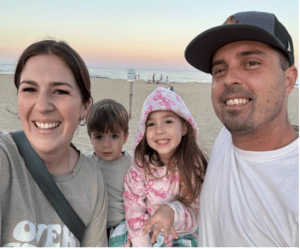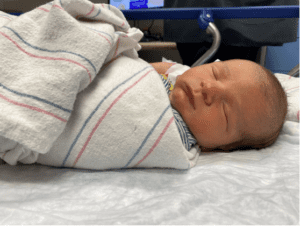Matteo - Delaware
Introduction:
In April 2021, just 9 months postpartum with my daughter Mia, I was surprised to learn of my second pregnancy. We were overjoyed to discover we were having a son! This is the story of our journey with Matteo, from the early days of joy to the challenges we faced with his diagnosis of Cobalamin C Disorder (CblC).
 Pregnancy and Birth:
Pregnancy and Birth:
Having been in the fitness industry for the last 14 years, I stayed active and maintained a healthy diet throughout my pregnancy. I was much smaller in comparison to my first pregnancy but chalked it up to my hard work through fitness. Since I had just had my daughter in 2020, and it was less than a year later, in 2021 I opted not to have genetic testing of any sort done. How much would have changed in 9-10 months, right? I felt my pregnancy was great! I had lots of energy, and everything seemed normal to me. Matteo was born on a Sunday in December at 39 weeks. It was a smooth, easy delivery, and he seemed perfect in every way. He was a peanut at just 6 pounds, smaller than our first child who was 8 pounds 2 ounces. We received no indication that anything was wrong from the delivery team.
Initial Concerns:
Matteo slept a lot in the recovery room, longer than I expected even for a newborn, and he didn’t want to eat much in his first 48 hours. We thought it was minor jaundice, like what our daughter experienced, so we weren’t alarmed. We stayed in the hospital for 48 hours. Matteo was put under the “baby lights” and we were sent home with some instructions to see the pediatrician about the jaundice levels. We still had zero indication that anything was wrong. However, on our first night home, Matteo slept overnight from 9 pm to almost 6-7 am. I was terrified when we woke up, as a crying baby hadn't woken me up. Despite reassurances from family that he was just a "good baby," my gut felt something was off. I began to make calls to the pediatrician and ER.
Diagnosis:
Not even a few hours later, we received a call from the hospital telling us that some elevated levels had come up on Matteo’s newborn screening. We were panicked. I distinctly remember hearing the phrase “urgent but not emergent.” They gave very little details, but all of my fears over the last 48 hours were confirmed. I called Matteo’s dad crying hysterically. We were instructed to go to Washington DC, a drive more than 2-hours away.
We had a 1 ½ year old toddler, and I didn’t yet fully understand what was happening. I advocated going to the metabolism team at CHOP in PA which was about 35 minutes from us instead. Just 20 minutes later, I got a call from the on-call doctor at CHOP telling us Matteo had what they thought was Cobalamin C and needed to come to the ER for confirmation and bloodwork. I remember listening to the doctor on the speakerphone, while sobbing and looking at my beautiful new baby, scared of what was to come.  At the ER, Matteo was hooked up to machines and IVs. Several tests were done, and we received vague instructions while waiting to meet the metabolism team in person. The voices from that night still swirl in my head:
At the ER, Matteo was hooked up to machines and IVs. Several tests were done, and we received vague instructions while waiting to meet the metabolism team in person. The voices from that night still swirl in my head:
"You will need to change to breast milk as soon as possible", "You will likely need to give him a shot every day.”, “Protein of all kinds will be a problem.”, “Do you know much about b12?”, "He may have heart, eye, and muscle issues in the future.”, and "We don’t know what his neurological development will be like."
What did any of this mean? I was too stunned to ask questions, nor did I know which ones to ask. The next day, we moved from the ER to the metabolic wing and received the confirmed diagnosis of Cobalamin C Disorder. Our family drove home with our new diagnosis, some syringes, some syrupy meds, and a new way of life we didn’t know how we were going to navigate.
Cobalamin C (CblC) deficiency is a rare, inherited metabolic error that prevents the body from processing vitamin B12 properly. It's caused by mutations in the MMACHC gene and can affect people of all races and ethnicities. CblC deficiency can present in children or adults, but it can be difficult to diagnose in adults because of its rarity and many possible symptoms. Early diagnosis can help prevent permanent neurological damage.
Early Challenges:
That night, I took to the internet. In 2021 without having a Facebook account, I found that there wasn’t much out there but extremely difficult-to-read articles. TikTok had nothing and Instagram had limited others sharing their stories. We had no idea what we were in for. I started trying to learn anything and everything I could. We felt scared, overwhelmed, and shocked. We had no tribe to get us through. We did so much on our own in terms of Matteo’s medical advocating, learning, and treatment. Now, when I tell people about our story, (learning of the diagnosis and being newly postpartum) I always feel like this part was a dream, and then I blacked out for about the next 12 weeks.
 One of the earliest memories of Matteo’s diagnosis was having our metabolic specialist doctor drive medication to our home to see Matteo through the doorway (it was during COVID) and to make sure that ALL of us were ok. It was one of the most heartwarming, incredible moments I have felt. The first few weeks were difficult as we adjusted to giving shots and meds and starting to breastfeed and pump, all while caring for two babies. We compartmentalized our worries and didn’t share much about Matteo’s diagnosis publicly for fear of not having the answer or becoming emotional. I frequently called the doctors with questions, and they were extremely helpful, sensing my highly emotional and scared state. Everyone in our family had an opinion they found on the internet over the next few weeks, and it was overwhelming to decipher. Over the next 6 months, we saw CblC manifest in various ways. Matteo was in the 2nd percentile for height and weight, had low muscle tone, had trouble tracking with his eyes, and was extremely sleepy. He didn’t learn to sit up until he was nearly 8 months old, and it was with the help of an amazing physical therapist who we worked with until Matteo was roughly 14 months old that he could stand on his own. Matteo would have good days and bad with fatigue. Overall, we dealt with each day with strength and knowing that Matteo was going to be the best version we could give him.
One of the earliest memories of Matteo’s diagnosis was having our metabolic specialist doctor drive medication to our home to see Matteo through the doorway (it was during COVID) and to make sure that ALL of us were ok. It was one of the most heartwarming, incredible moments I have felt. The first few weeks were difficult as we adjusted to giving shots and meds and starting to breastfeed and pump, all while caring for two babies. We compartmentalized our worries and didn’t share much about Matteo’s diagnosis publicly for fear of not having the answer or becoming emotional. I frequently called the doctors with questions, and they were extremely helpful, sensing my highly emotional and scared state. Everyone in our family had an opinion they found on the internet over the next few weeks, and it was overwhelming to decipher. Over the next 6 months, we saw CblC manifest in various ways. Matteo was in the 2nd percentile for height and weight, had low muscle tone, had trouble tracking with his eyes, and was extremely sleepy. He didn’t learn to sit up until he was nearly 8 months old, and it was with the help of an amazing physical therapist who we worked with until Matteo was roughly 14 months old that he could stand on his own. Matteo would have good days and bad with fatigue. Overall, we dealt with each day with strength and knowing that Matteo was going to be the best version we could give him.
Major Health Scare:
When Matteo was 4 months old, he contracted COVID-19. It was one of the scariest parts of our journey. He began to stop eating, was losing weight rapidly, was coughing, sleeping more, and not taking his daily meds. Getting an infant to take oral meds was hard, let alone while having an illness. Matteo was hospitalized, hooked up to IVs, EKG, and pulse oximetry. I remember looking at him and seeing how incredibly tired he looked and PLEADING with the team to find a way to help him. The next morning when he woke up, after good fluids and meds, Matteo was a little more like himself again and for the first time in 3 days, I could breathe. It was then I learned that this would be our life: on the constant edge of quick decisions and hospital visits whenever Matteo contracted a severe illness. This would be the first of many hospital stays for us.
Ongoing Management:
Matteo, who we fondly call Teo Bob, is now a thriving 2 ½-year-old who defies the odds of his rare disease each day. He attends a medical daycare program where he receives occupational, physical, and speech therapy daily—something I wish we had started sooner. Matteo is as mischievous as any little boy, loves basketball, baseball, and football, and enjoys snuggling, reading books, and playing with his sister in the evenings.
Reflection and Advice
In the 2 ½ years since Matteo’s diagnosis, we have experienced a rollercoaster of emotions. We celebrate the small wins, take each day as it comes, and learn about the challenges that lie ahead. We rely on our friends in HCU Network America as our tribe when we need help. Explaining his rare disease to others, I feel passionate and excited to raise awareness. Every day feels like overcoming a new challenge, from hunting down out-of-stock meds to balancing nutritious meals and teaching Matteo new words. My advice to anyone who has just received a diagnosis is: find your people, extend your network, ask for help, and advocate hard. No one knows your child like you do. In the future, we hope to learn more about ways to help Matteo’s development, that his symptoms don’t present themselves harshly, and that he gets to live the life that he dreams!
